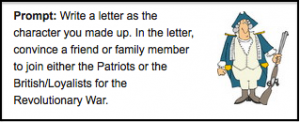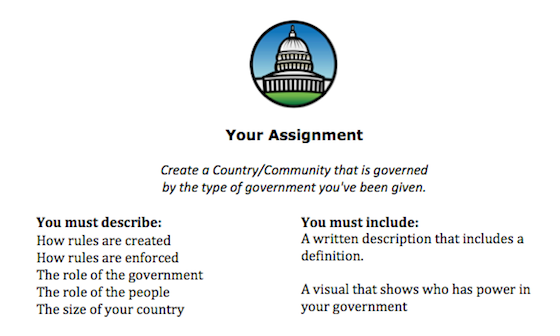Scrapping Outdated Lessons
A MiddleWeb Blog
Last week I scrapped an American History lesson I’d been using for years. It had worked, it took time to create–it even contained lamination. I loved it, but I had to be honest with myself: it just wasn’t working anymore.
This was our government spectrum lesson. It conceptually bridged our last historiography lesson (that introduced the QAR comprehension strategy) and our first lesson in the Constitution unit. I still needed the content for the bridge between units, but I had to come to terms with the fact that the lesson itself just wasn’t clicking with students — no matter how many times it had worked in the past.
The phrase “kill your darlings” is a term often used by writers. Despite its disturbing allusion, it simply means to get rid of any writing that is overworked, not useful, or too wordy. This concept applies to lesson-writing teachers as well.

Each year I’ll do some revision, of course. But completely scrap a lesson plan? Do I have to? What about all the hours I put into it!
This is my usual reaction when I hear that quiet yet persistent voice in my head, whispering after a lesson: “that didn’t work….” I have always been reticent to throw away something I’ve polished and perfected over time. But what I have found from experience is that if it doesn’t quite work, and if upon reflection you feel that it hasn’t worked for awhile, then it’s time to trash it, however painful it’s going to be. “Kill your darlings” is a harsh term because it hurts to get rid of your creations.
Revisiting Goals
Killing your darlings is especially important for a teacher in the digital age. To get to the place where we can consider scrapping lessons, we first need to reflect on our current curriculum and make sure that it is (1) relevant to our students’ lives and (2) current in terms of both pedagogy and technology.
Even some of my lessons from just four years ago need a makeover in order to stay current and utilize the tools at my students’ disposal. Whether it is a lesson, a unit, or an assessment, the question is always the same: “what do I want the students to know and be able to do?” Once we’ve answered that question, we have to decide whether our current creation is achieving what we seek. If not, it’s time for the scrap heap.

I tried comparing it to email. “You mean, like I would email my teacher about an assignment?” Sort of. But as teachers, we are often looking for the informal small-talk of letter greeting: How are you? How is the weather? How is the family? This is not the kind of exchange that our students are used to. They don’t often email, and texting gets straight to the point.
This student’s experience raises the question: is the ubiquitous “write a letter from the perspective of _____historical figure” an assignment that is relevant to our students’ lives? Ostensibly, that was one of its original purposes. But we may need to re-examine how the “write a letter” prompt is working in the age of mobile devices and instant communication. We may need to scrap it.
Reworking or Rewriting
My government spectrum lesson used to be a constructivist learning activity. Students were asked to place governance-related symbols and pictures on a spectrum, sans any teacher guidance or definitions of the government types. It used to be a challenge for the students, but a surmountable challenge. Over the past two years, I have noticed that the students haven’t been making the connections with this activity. Maybe they never were and I was too attached to the lesson’s concept to notice. But this year, after having to stand up in the front of the room and re-clarify and re-clarify, I had to admit something was wrong.
Back to the drawing board:

What lessons have you and your students outgrown? What have you re-worked recently?





































Here is my dilemma with the letter writing assignment. I have an assignment where students have choice of writing a letter to someone from country they came to talk about colonies incorporating way of life, etc. etc. I am not “married” to the assignment BUT have a real concern about this generation “losing” the art of letter writing just because we say students text now or whatever. That is one way history has been passed down and will emails sustain the test of time? I truly question that.
We definitely agree that there is merit in the art of letter writing, and it seems it may be something that this generation is losing. But because it isn’t as common any longer, a letter writing assignment is therefore assessing the students’ ability to write a letter along with their understanding about content. If a letter writing assignment is still a helpful vehicle for your students to show content understanding (and it may very well be depending on the content and context), you will also have to explicitly teach them how to write a letter and co-assess that skill along with content knowledge.